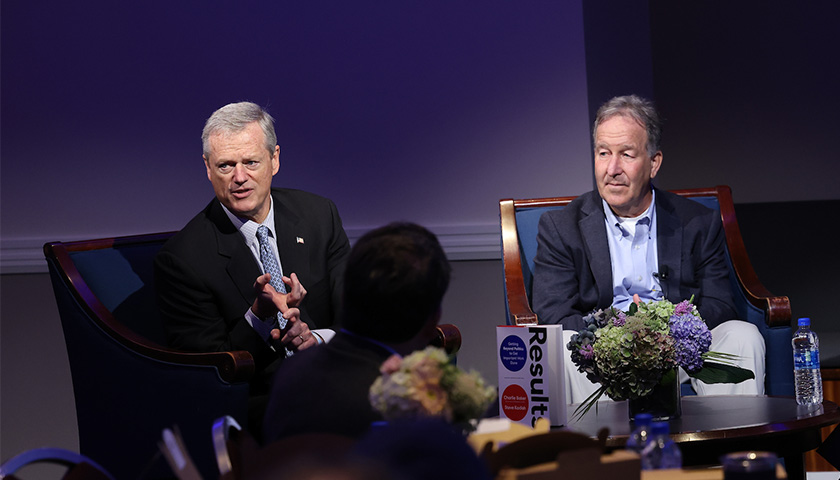Governor Charlie Baker Meets with Sawyer Business School Faculty

Suffolk University has a long history of sending graduates to the Massachusetts State House, which sits just steps from campus. That’s the reason Governor Charlie Baker and Steve Kadish reached out to Professor Sandy Matava in the Sawyer Business School’s Moakley Center for Public Management. Baker and Kadish have just published a new book, Results: Getting Beyond Politics To Get Important Work Done, and wanted to share their ideas with Suffolk faculty.
The discussion was moderated by Professor Richard Taylor, director of Suffolk’s Center for Real Estate and himself a veteran of state politics; he was former secretary of transportation under Governor Bill Weld. Baker and Kadish—the governor’s first chief of staff—recounted many of the issues Baker has faced in the seven years he’s been governor: Negotiating the early days of the pandemic. Handling the opioid crisis. Choosing judges for the Supreme Judicial Court. Oh, and dealing with the MBTA.
Baker’s visit came less than a week after a complete closure of the Orange Line, so the issue of the T was on many people’s minds. He was honest when asked about it: “It makes me crazy that the T is still the problem child today that it was when we took office,” he said. He pointed out that most of the money his administration has spent on the T has been for things that nobody sees and have no obvious political gain—including essential equipment like signals, railroad ties, and switch warmers. Baker also reminded attendees that parts of the MBTA, including The Ride for seniors and the commuter rail, which was crippled by blizzards in 2015, are in much better shape than they were when he took office.
Big Issues, Big Solutions
The discussion wasn’t just about the T, of course. Baker and Kadish offered intriguing glimpses of the inner workings of the Commonwealth’s executive branch on a host of issues.
On choosing judges for the Supreme Judicial Court: “You want people who really appreciate the magnitude of their responsibility and the humility that comes with it,” said Baker.
On picking people for executive branch: For Baker, a strong secretary of administration and finance is essential. “If you get the budget stuff right, it makes everything easier.”
On the COVID command center they set up in the first days of the pandemic: “Looking back on it now, it’s kind of amazing we didn’t really know if it was going to be necessary,” said Baker. “Clearly it was.”
On all these challenges and issues, they applied the guidelines that they outline in the book: people are policy, follow the facts, focus on “how,” and push for results. “[Our COVID response] was a living example of the book,” said Kadish. “People, facts, how, and then the results, and then continually evaluating the results and making adjustments.”
“The book is supposed to be a statement about the positive work government can do.”
Take a Short Walk Up the Street
Baker made reference at the start of the talk to the number of Suffolk graduates working in state and local government. And he stressed the importance of sustaining the connection between the University and the State House.
“There should be a worn-out walk between the top of the hill and the bottom of the hill—between the executive branch and Suffolk—on a lot of things,” he said. “And I think that can work in both directions.” Indeed, through its Moakley Center for Public Management, the University already offers a host of certificate programs for public and nonprofit sector employees.
Kadish echoed the importance of Suffolk University’s role in promoting government service. “I think people understand the federal government. And they understand cities,” he said. “But most people do not understand state government.” Suffolk, he suggested, could be a leader in helping people better understand the role of state governments—not just Massachusetts’ but those in every state.
Baker and Kadish said their fundamental goal in writing the book was to restore faith in government in a period marked by polarization and political gridlock. And they hope it can be useful to Suffolk faculty and students. “We both believe that when government overpromises and underdelivers, it’s hard for democracy to hold itself together,” said Baker. “The book is supposed to be a statement about the positive work government can do.”
Contact
Greg Gatlin
Office of Public Affairs
617-573-8428
Ben Hall
Office of Public Affairs
617-573-8092



